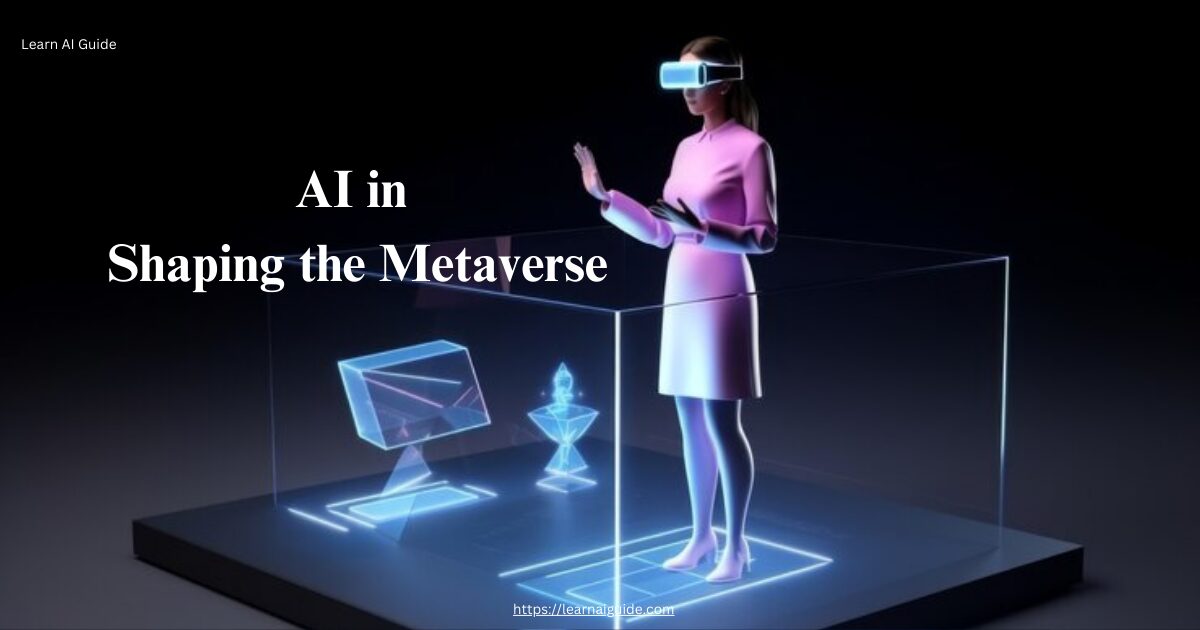AI in Shaping the Metaverse
The metaverse, a virtual universe where users can interact, socialize, and create, is rapidly evolving. Central to this evolution is artificial intelligence (AI). The Role of AI in Shaping the Metaverse
AI is not just a tool but a driving force that enhances the metaverse, making it more immersive, interactive, and intelligent. This article delves into the role of AI in the metaverse, exploring its applications, challenges, and future potential.
The Role of AI in Shaping the Metaverse
Understanding the Metaverse
The metaverse is a collective virtual shared space, created by the convergence of virtually enhanced physical reality and physically persistent virtual reality.
It includes augmented reality (AR), virtual reality (VR), and other immersive digital experiences. The metaverse is not just a single space but a network of interconnected environments.
It’s where people can work, play, socialize, and even trade digital assets.
The Role of AI in the Metaverse
AI is foundational to the metaverse. It enhances the virtual environment, making it more responsive and adaptive.
AI technologies such as machine learning, natural language processing, and computer vision are integral to creating dynamic, interactive experiences.
AI’s ability to analyze vast amounts of data in real-time makes it indispensable for the metaverse’s functionality.
Enhancing User Experiences with AI
One of the primary roles of AI in the metaverse is to enhance user experiences. AI can personalize virtual environments based on user preferences and behaviors.
This personalization makes each user’s experience unique and engaging. AI-driven avatars and non-player characters (NPCs) add a layer of realism to the metaverse.
These AI characters can interact with users in natural and intuitive ways, making the virtual world feel more alive.
AI in Content Creation and Management
Content is the heart of the metaverse, and AI plays a crucial role in content creation and management. Generative AI can create immersive content and assets, such as landscapes, buildings, and characters.
This capability reduces the time and effort required for content creation. AI also automates content moderation and curation, ensuring that the virtual environment remains safe and enjoyable for all users.
AI’s ability to dynamically build and modify virtual worlds in response to user interactions creates a more engaging and responsive experience.
AI-Driven Analytics and Insights
Understanding user behavior is essential for enhancing engagement in the metaverse. AI-driven analytics provide deep insights into how users interact with the virtual environment.
These insights help developers optimize the metaverse, making it more engaging and intuitive.
Real-time analytics powered by AI enable the immediate adjustment of virtual experiences based on user feedback, ensuring continuous improvement.
Ensuring Security and Privacy with AI
Security and privacy are paramount in the metaverse. AI plays a critical role in ensuring both. AI can detect and mitigate security threats in real-time, protecting users and their data.
Artificial Intelligence algorithms can identify unusual patterns that may indicate a security breach, allowing for swift action. Enhancing data privacy and user anonymity through AI is also crucial.
AI can manage and protect personal data, ensuring that users’ privacy is respected. Ethical considerations and responsible AI use are essential to maintaining trust in the metaverse.
Challenges and Limitations of AI in the Metaverse
Despite its potential, AI in the metaverse faces several challenges. Technical challenges such as scalability and real-time processing must be addressed to ensure smooth user experiences.
Ethical and societal implications, including bias and discrimination, are also significant concerns. Balancing innovation with regulation and standards is crucial to ensure that AI’s use in the metaverse is responsible and fair.
Future Trends and Innovations
AI’s potential to drive future metaverse advancements is immense. Emerging technologies like quantum computing and 5G will further enhance AI’s capabilities.
These advancements will enable more complex and immersive virtual experiences. Predictions indicate that AI will continue to be a key driver of innovation in the metaverse, opening new opportunities for businesses and developers.
Practical Applications and Case Studies
Real-world examples of AI in the metaverse are already emerging. In gaming, AI creates more realistic and interactive environments, enhancing player experiences.
Virtual commerce is another area where AI is making a significant impact, enabling personalized shopping experiences.
Social platforms in the metaverse use AI to facilitate meaningful interactions and connections. Industries like education, healthcare, and entertainment are also exploring AI’s potential in the metaverse, with promising results.
Case Study: How Meta Uses AI
Meta, formerly Facebook, is at the forefront of using AI in the metaverse. Meta uses AI to create immersive virtual environments, enhance user interactions, and ensure security.
AI-driven personalization in Meta’s virtual spaces makes user experiences more engaging and enjoyable. Meta’s use of AI also extends to content moderation and privacy protection, ensuring a safe and respectful environment for all users.
Conclusion
AI’s role in shaping the metaverse is transformative. From enhancing user experiences to driving content creation and ensuring security, AI is integral to the metaverse’s success.
As we look to the future, AI will continue to be a key driver of innovation, opening new possibilities and opportunities.
The metaverse, powered by AI, represents the next frontier in digital experiences, offering limitless potential for creativity, interaction, and growth.
The Role of AI in Shaping the Metaverse that’s all for today, For More: https://learnaiguide.com/top-10-in-demand-ai-jobs-roles-for-2024/
